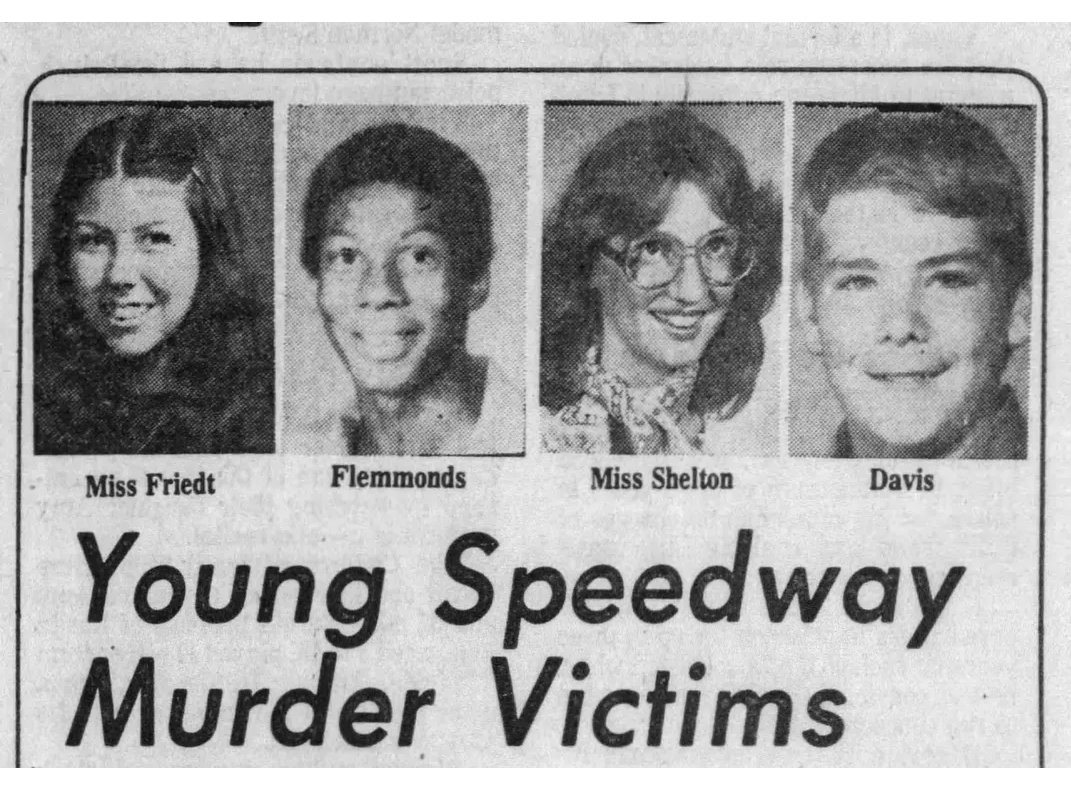It remains one of the most notorious unsolved murders in Indianapolis history. In November of 1978, four teenage employees of the Speedway, Indiana Burger Chef mysteriously disappeared on a Friday night after closing time. Two days later, their bodies were found in an isolated area of rural Johnson County. Two of the teens had been shot, one stabbed, and one beaten.
Now, Australian filmmakers Adam Kamien and Luke Rynderman have churned out “The Speedway Murders,” a docudrama reviewing the Burger Chef Murder case that purportedly reveals new information.
“The Speedway Murders” does an excellent job of re-familiarizing us with this terrible crime, and providing an accurate sense of time and place – including the local disco lounge across the street alongside the hairstyles and clothing of the late ‘70s.

Unfortunately, several things work against Kamien and Rynderman – two of which are not their fault. First, the Speedway Police infamously bungled the investigation from the get-go. They found the restaurant had been robbed – money taken from the safe, lights on, rear of the restaurant disarrayed. They quickly attributed it to a penny ante robbery, promptly cleaned up the place, and informed the manager he could re-open for business the following day. No photos were taken, and no attempt was made to contact the families of any of the four young employees. When their bodies were discovered that Sunday, the police tried to re-stage the robbery as they had found it two nights prior!
An argument could be made that “nothing ever happens in sleepy little Speedway,” but as Kamien and Rynderman remind us, the summer of 1978 was the summer of the notorious “Speedway Bomber,” in which several bombs were planted around Speedway – one of which caused a man to lose part of his leg. So, it’s not as though Speedway were absent major crime that year.
And, we also learn, several other Burger Chefs in the Indianapolis area had been victims of recent robberies. But, even without the preceding bombing spree and robberies, the initial lack of even an informal investigation is unforgivable.
Also working against the filmmakers is a fact we learn in the closing titles – most of the potential suspects have already died. I realize the families of the victims still long for closure, but it’s impossible to obtain a confession from the deceased. And the supposed “new information” is not entirely evident. Two recent interviews with witnesses would appear to point the finger at one now-deceased individual, but it’s hard to state with any certainty whether either is telling the truth. And, neither has been interviewed by the police – even though they have both approached the police to inform them of their desire to share pertinent information. These men simply want their stories to be heard.
So, the proverbial deck of cards is already stacked against the filmmakers. But the most egregious sin of “The Speedway Murders” is of one of their own making. In this day and age of true-crime stories all over television, I have no problem with the use of actors to re-enact the happenings of 46 years ago. It’s helpful for us to see the van approach the back of the restaurant, the perpetrators lock the kids in the storage room, then lead them to the van, and drive them to Johnson County. This is a common technique in modern documentaries, and it is directly responsible for the term “docudrama.”
But Kamien and Rynderman take the docudrama approach a step further when they have the actors (a) speak to themselves in hindsight (i.e. after their deaths), and (b) directly to the audience, thereby breaking the so-called “fourth wall” between performers and audience. It’s a great approach for live theatre, but very difficult to pull off in film – save for slapstick comedies like “Airplane!”
Kamien and Rynderman claim their goal is to present the four young victims as real people, whose lives were cut tragically short – as opposed to mere crime statistics. That’s certainly a noble objective, but there’s simply no excuse for the utter cheesiness of four young actors poring over police evidence regarding their own case. The greatest Shakespearean actor in the world could not convincingly pull off lines like, “What about this new evidence revealed seven years after our deaths?”
A far more effective approach would have been to employ a voiceover narrator to periodically review the facts which the filmmakers had presented up to that point. This would also set the stage for the “new information” revealed at the end of “The Speedway Murders,” which again is so buried in the confusing approach to the material that it’s difficult to say which interviewee is the one with the new details.
The Burger Chef Murders is a fascinating case, and one that is forever etched in the memories of longtime Indianapolis residents. It deserves better than the bungled Speedway police investigation. It deserves better than another round of “cold case” investigation by the Indianapolis Police Department. And it certainly deserves better than “The Speedway Murders.” Unfortunately, after this attempt there is not likely to be another effort made to present the case in a documentary format.






Comments 1
I thought it was fine. It seems like the criticisms of the documentary overshadow the real problem with this case. That is how the police bungled the case and fabricated “evidence.” Maybe instead of criticizing the documentary, put your time into looking at the police actions or inactions. I see the police protecting someone.